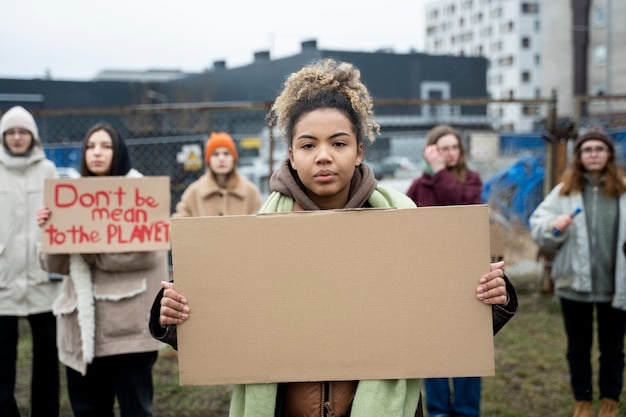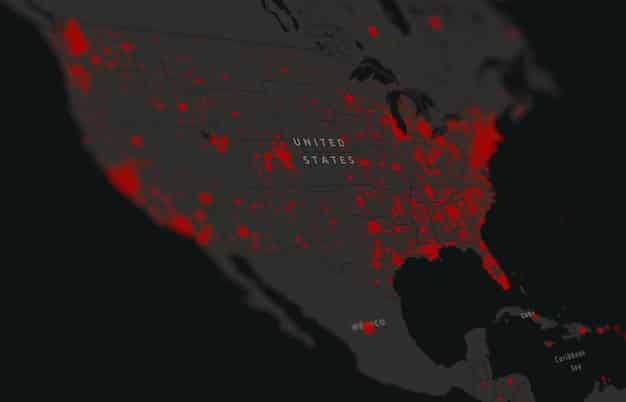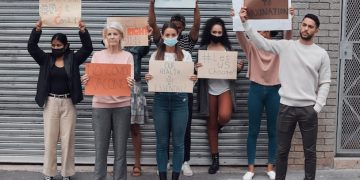Examining the Rise in Hate Crimes: Causes and Solutions

Understanding the 15% Increase in Reported Hate Crimes: What Are the Underlying Causes and Solutions? involves analyzing societal factors such as political polarization, racial tensions, and economic inequality, while also exploring potential solutions like community-based programs, policy reforms, and educational initiatives.
The recent 15% increase in reported Understanding the 15% Increase in Reported Hate Crimes: What Are the Underlying Causes and Solutions? has sparked national concern. It is crucial to delve into the factors that contribute to this alarming trend and explore meaningful solutions to combat hate and prejudice.
Understanding the Increase in Hate Crimes
The surge in reported hate crimes is a multifaceted problem influenced by a complex web of social, political, and economic conditions. Identifying the root causes is the first step toward developing effective strategies to address this critical issue.
Data Analysis of Hate Crime Statistics
Analyzing hate crime statistics requires a careful examination of when and where these incidents occur, as well as the motivations of the perpetrators and the demographics of the victims. Understanding these patterns helps to target prevention efforts and allocate resources effectively.
Challenges in Reporting and Data Collection
One of the significant challenges in analyzing hate crime data is the underreporting of incidents. Many victims are reluctant to come forward due to fear, distrust of law enforcement, or lack of awareness about reporting mechanisms. Improving reporting rates is crucial for getting a more accurate picture of the problem.
- Enhance community outreach to build trust.
- Simplify the reporting process to make it more accessible.
- Provide training to law enforcement on identifying and classifying hate crimes.
- Implement anonymous reporting options to protect victims.
Ultimately, understanding the increase in hate crimes requires a commitment to data transparency, community engagement, and evidence-based solutions.

Societal Factors Contributing to Hate Crimes
Several societal factors have been identified as potential contributors to the recent rise in hate crimes. Political polarization, racial tensions, and economic inequality are among the key forces at play. These factors can create a climate of division and animosity, making certain groups more vulnerable to hate-motivated attacks.
Political Polarization and Hate Speech
The increasing polarization of political discourse has created an environment where hate speech and extremist ideologies can flourish. When political leaders and media outlets use divisive language, it can normalize prejudice and incite violence against targeted groups.
Racial Tensions and Historical Injustices
Long-standing racial tensions and historical injustices continue to fuel hate crimes in many communities. The legacy of slavery, segregation, and discrimination has created deep-seated grievances and resentments that can manifest in acts of hate and violence.
- Address systemic racism through policy reforms.
- Promote restorative justice practices to heal community divisions.
- Invest in education programs that teach about history and diversity.
- Support community-based initiatives that foster dialogue and understanding.
Combating hate crimes requires a comprehensive strategy that addresses both the immediate symptoms and the underlying social and economic causes.
The Role of Social Media and Online Radicalization
Social media platforms have become powerful tools for spreading hate speech and extremist ideologies. Online radicalization can occur when individuals are exposed to a constant stream of hateful content, leading them to become more accepting of violence and discrimination.
Algorithms and Echo Chambers
Social media algorithms often create echo chambers, where users are primarily exposed to content that confirms their existing beliefs. This can lead to further polarization and the reinforcement of extremist views.
Monitoring and Content Moderation
Social media companies have a responsibility to monitor their platforms for hate speech and take action to remove content that violates their terms of service. However, content moderation alone is not sufficient to address the problem of online radicalization.
- Strengthen content moderation policies and enforcement.
- Invest in AI and machine learning technologies to detect hate speech.
- Promote media literacy education to help users identify misinformation.
- Partner with civil society organizations to counter extremist narratives.
By reducing the spread of hateful content and empowering individuals to critically evaluate information, we can mitigate the risk of online radicalization and reduce the likelihood of hate crimes.

Community-Based Approaches to Preventing Hate Crimes
Community-based programs play a vital role in preventing hate crimes by promoting tolerance, building trust, and fostering positive relationships between different groups. These programs often focus on education, dialogue, and reconciliation, helping to break down barriers and create a more inclusive society.
Education and Awareness Campaigns
Education and awareness campaigns can help to dispel stereotypes, challenge prejudice, and promote understanding of different cultures and perspectives. These campaigns can be targeted to schools, workplaces, and communities, reaching a wide range of people with positive messages about diversity and inclusion.
Building Bridges Between Communities
Building bridges between different communities can help to reduce fear and mistrust, creating opportunities for people to learn from each other and build relationships. This can be achieved through interfaith dialogues, cultural exchange programs, and joint community service projects.
Engaging local leaders, community organizations, and residents in collaborative problem-solving can lead to more effective and sustainable solutions.
Investing in community-based programs is an essential step toward preventing hate crimes and building a more equitable and just society.
Policy and Legal Reforms to Combat Hate Crimes
Strengthening hate crime laws and policies is crucial for holding perpetrators accountable and sending a clear message that hate-motivated violence will not be tolerated. Policy reforms can also address systemic inequalities that contribute to hate and discrimination.
Enhancing Hate Crime Laws
Many states and countries have hate crime laws that provide enhanced penalties for crimes motivated by bias. Strengthening these laws can ensure that perpetrators are held accountable for the harm they cause and that victims receive the support they need.
Addressing Systemic Inequalities
Policy reforms can also address systemic inequalities that contribute to hate and discrimination. This can include measures to promote equal access to education, employment, and housing, as well as policies to combat racial profiling and police brutality.
- Increase funding for hate crime investigations and prosecutions.
- Provide comprehensive training to law enforcement on identifying and responding to hate crimes.
- Establish independent oversight bodies to review hate crime data and policies.
- Enact legislation to protect vulnerable groups from discrimination and violence.
By sending a clear message that hate crimes will not be tolerated and addressing the root causes of discrimination, we can create a more just and equitable society for all.
The Importance of Reporting Hate Crimes
Reporting hate crimes is essential for documenting the true extent of the problem and holding perpetrators accountable. When victims come forward, they not only seek justice for themselves but also contribute to a broader effort to combat hate and discrimination.
Supporting Victims of Hate Crimes
Providing support and resources to victims of hate crimes is crucial for helping them heal and recover from the trauma they have experienced. This includes access to counseling, legal assistance, and victim advocacy services.
Encouraging Bystander Intervention
Encouraging bystander intervention can also play a vital role in preventing and responding to hate crimes. When individuals witness an act of hate, they can take action to support the victim, report the incident, or intervene to stop the harassment or violence.
Promoting a culture of reporting and intervention is essential for creating safer and more inclusive communities.
| Key Point | Brief Description |
|---|---|
| 📊Data Analysis | Examining hate crime statistics to identify patterns. |
| 📢Social Media | Combating hate speech and online radicalization. |
| 🤝Community Programs | Promoting tolerance and building community trust. |
| ⚖️ Policy Reforms | Strengthening hate crime laws and policies. |
Frequently Asked Questions
▼
Political polarization, racial tensions, economic inequality, and extremist ideologies can contribute to hate crimes. Social media and online radicalization also play a significant role by spreading harmful content.
▼
Communities can implement education and awareness campaigns, build bridges between different groups, and support community-based programs that promote tolerance and understanding. Engaging local leaders can help.
▼
Social media can amplify hate speech and facilitate online radicalization. Algorithms create echo chambers, reinforcing extremist views. Social media companies must monitor their platforms and enforce content moderation policies.
▼
Enhancing hate crime laws, increasing funding for investigations, providing training to law enforcement, and enacting legislation to protect vulnerable groups are essential legal reforms to combat hate crimes.
▼
Reporting hate crimes documents the extent of the problem and holds perpetrators accountable. It ensures victims receive support and contributes to broader efforts to combat hate and discrimination promoting safer communities.
Conclusion
Understanding the 15% increase in reported Understanding the 15% Increase in Reported Hate Crimes: What Are the Underlying Causes and Solutions? requires a multifaceted approach that addresses societal factors, online radicalization, and policy reforms. By promoting tolerance, building community trust, and strengthening hate crime laws, we can work towards a more inclusive and just society for all.





